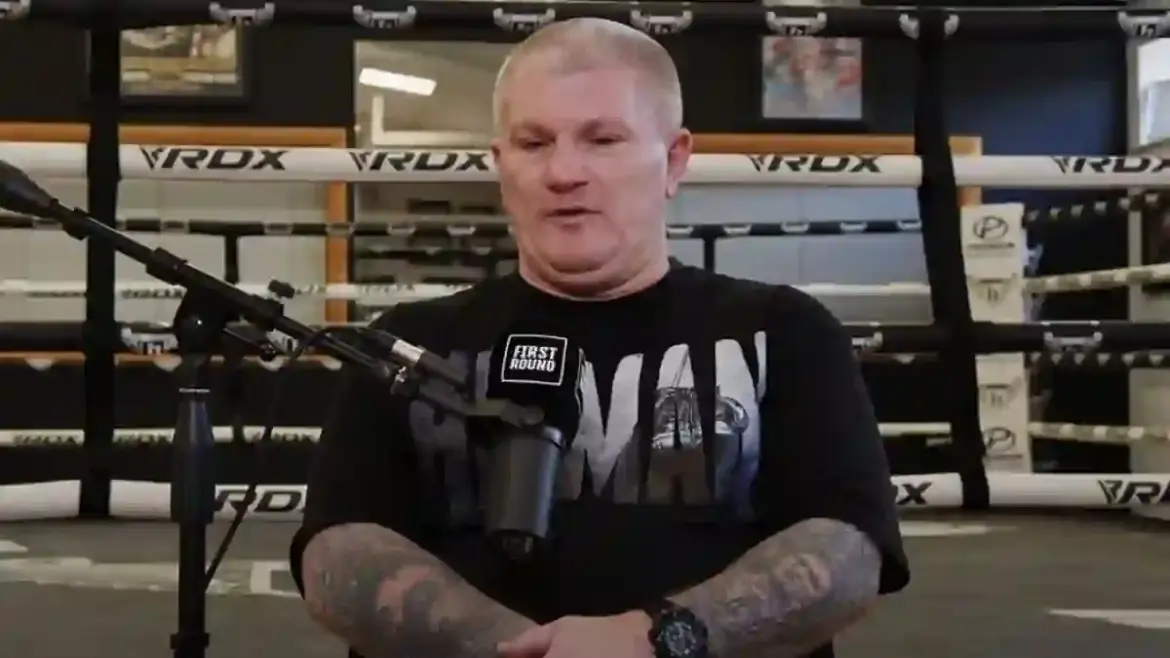Just days before his tragic passing, Ricky Hatton, the beloved boxing icon, spoke candidly about the battles he had faced off the ring.
Known for his ferocious style in the ring as “The Hitman,” Hatton had also fought private struggles with mental health, depression, and thoughts of suicide—a story he courageously shared to inspire others.
Hatton was found at his home in Hyde, Greater Manchester, by his close friend and manager Paul Speak earlier this month.
Authorities are not treating his death as suspicious.
The news has sent shockwaves across the sporting world, with tributes pouring in from fellow boxers like Tyson Fury and Amir Khan, and sports legends including Roy Keane and David Beckham.
A Message of Hope and Gratitude
In a poignant interview just four days before he died, Hatton reflected on the relief he felt for having chosen to seek help during his darkest moments.
Speaking with First Round TV, he said, “Thankfully, I didn’t get to the stage where I ended up killing myself.
I got to the stage where finally for whatever reason I decided to go and knock on someone’s door and say, ‘please help me.’”
He continued to express gratitude for the life he had lived since that decision.
“Never better, to be honest with you,” Hatton said. “I thank myself every day for that.
I didn’t kill myself because I wouldn’t have seen my granddaughter, I wouldn’t have made up with Billy Graham, I wouldn’t have done my documentary, got great feedback from that.”
He also joked about his post-boxing appearances, including exhibitions with Marco and Tony Barrera and appearing on Dancing on Ice, emphasizing that despite the hardships, he found joy and purpose in inspiring others through his experiences.
From Darkness to Advocacy
Hatton had become an outspoken advocate for mental health in the years following his retirement.
He openly discussed his battles with depression, substance abuse, and suicidal ideation, encouraging others to seek help.
“I want to try and pass a little bit on to somebody,” Hatton said. “If I can go and speak to someone and talk about mental health and say, ‘Listen, you don’t hold it in.
Go and speak to someone,’ it’d be the best thing you do.”
Receiving letters from those he inspired brought Hatton immense comfort.
“Not only does it help others, it helps me because it makes me feel good that I’ve helped others,” he said.
Friends and Family React to the Tragedy
Paul Speak, Hatton’s longtime friend and manager, described the shock of finding Hatton at his home.
“I firmly believe he didn’t intend to do it. It’s for the coroner to determine, but he had it all to live for,” Speak told Boxing News.
He recounted the emotional moment and the disbelief he felt, having witnessed Hatton navigate both the highest peaks in boxing and the lowest points in life.
Hatton’s Battle with Mental Health
Hatton first revealed his struggles with suicidal thoughts in 2018, recalling the immense pressures of his career and strained family relationships.
“I’d come into the gym to train and the boys felt I was all right, but I’d go home and sit there crying.
Just seeing my dad drive past the gym would send me under. It was an horrendous time,” he admitted.
His openness about mental health has been praised for helping others feel less alone in their struggles, showing that even champions face invisible battles.
Tributes Continue Across the Sporting World
In the wake of his passing, tributes have poured in from across sports.
Manchester City, a club Hatton loved, commissioned a tifo display during their home match against Burnley.
Family members, including his son Campbell, attended, placing flowers on Hatton’s empty seat in a moving gesture.
Fans across the country continue to honor his legacy, with a memorial service scheduled for Friday, October 10, at Manchester Cathedral.
While entry to the cathedral is ticketed, the procession route will be publicly available for those wishing to pay their respects.
Resources for Mental Health Support
Hatton’s story serves as a reminder of the importance of mental health awareness. Anyone struggling is encouraged to reach out for help.
For confidential support, contact Samaritans on 116 123, visit samaritans.org, or visit thecalmzone.net/get-support.f
